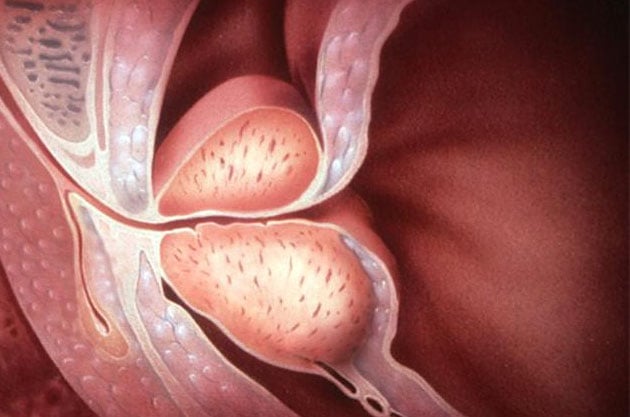Prostate cancer is the commonest cancer in men. There are concerns on whether frequent sex contributes to the development of prostate enlargement in general and especially in the evolvement of prostate cancer.
The prostate gland is an important part of the male reproductive system. It is a major contributor to the formation of the seminal fluid that comes with ejaculation at the peak of sexual intercourse in males.
It produces nourishing materials, especially the sugary fructose, for the wellbeing of sperm cells. It is located just below the bladder – where urine is stored, and in front of the rectum – the last portion of the large intestine where the feces is stored.
Prostate enlargement: 100 for 100
In anatomical relationship, the prostate surrounds the tube (urethra) that drains the urine from the urinary bladder, just as the tube is leaving the bladder.
Advertisement
A point of fact is that the prostate gland is destined to enlarge in all men as they get older, albeit at different rates in men of different extractions. Anyhow it goes, it is estimated with corroborative findings on autopsy that all men (100%) who lived up to 100 years had enlarged prostate – a case of 100 for 100!
The good thing however is that most prostate enlargements are usually of no clinical consequence and are not problematic or symptomatic to the affected men since the prostate growth are mostly non-cancerous (benign) and “non-strangulating”.
On the contrary, in a minority of cases, the prostate enlargement is symptomatic even when the growth is benign, where the enlarged prostate strangulates the urethra and makes it difficult to urinate in spite of repeated attempts. These could be very discomforting and mostly present as medical emergencies.
Advertisement
Cancerous growth
Similarly, some cases of prostate enlargement are actually cancerous, starting off as an abnormal growth in the prostate gland and growing beyond the bound of the prostatic capsule, extending into cum destroying surrounding tissues and can also get transported to and destroying distant organs like the backbone, liver, lungs and sometimes as far as the brain!
From the foregoing, there have been concerns about the role sex plays as a causative factor in prostate cancer. Before now, the widely held belief is that men who have high libido and are very active per sexual intercourse are likely to fall victim of prostate cancer than ‘low libido’ men. The scientific basis of this is postulation is that testosterone ─ the hormone which promotes the urge for sex in men and is produced in the testicles – is also known to spur the growth of the cancerous tissue in the prostate.
As a matter of fact, one major way that prostate cancer is treated is to cut off the main testosterone nourishment by removing the testicles, which often works.
Frequent sex may be protective
Hence, not until very recently, the mainstream hypothesis had been “too much sex” might provoke the development of prostate cancer but a recently published research study thinks the direct opposite, postulating that frequent sex may be a protective factor in prostate cancer.
Advertisement
The findings, published in the April 7 issue of The Journal of the American Medical Association and reviewed on webmd.com, are based on data collected from nearly 30,000 predominately white men aged 46 to 81.
At the start of the study, men provided information on ejaculation frequency in their 20s, 40s, and in the previous year (1991). Ejaculation frequency included sexual intercourse, masturbation, and nighttime ejaculations that can occur during sleep. The men were then monitored for eight years.
Ordinarily, researchers found most categories of ejaculation frequency were unrelated to prostate cancer risk. But when they looked at men in the highest category of ejaculation frequency (21 or more ejaculations in a month), they found evidence of a protective effect.
According to Michael Leitzmann, MD, an investigator at the National Cancer Institute in Bethesda, USA, who conducted the research during a post-doctoral fellowship at Harvard University, “when you look at the data in a little bit more detail, you do see that not only is there not an increased risk, but there is potentially even the possibility of a slight decrease in risk with high ejaculation frequency”.
Advertisement
Leitzmann says researchers suspected that ejaculation frequency might be a marker of a healthier, more active lifestyle. But when they accounted for diet, exercise, and other risk factors for prostate cancer, the link between frequent ejaculation and lower prostate cancer risk remained.
Bio-mechanism of how sex protects
Ejaculation may protect the prostate through a variety of biological mechanisms that merit further research, such as:
Advertisement
- Flushing out cancer-causing substances. Frequent ejaculation may help flush out retained chemical carcinogens in the prostate glands.
- Reducing tension. The release of psychological tension that accompanies ejaculation may lower nervous activity associated with stress and slow the growth of potentially cancerous cells in the prostate.
- Promoting rapid turnover of fluids. Frequent ejaculation may help prevent the development of mini-crystals that can block ducts within the prostate gland, reducing cancer risk.
Although the study found out frequent ejaculation appeared to lower the risk of developing prostate cancer, it is unclear how ejaculation may affect men destined to develop or already in the early stages of prostate cancer.
The Leitzmann’s study offers new information that sexual activity may not be negatively associated with prostate cancer, and it’s reasonable to believe that a “use it or lose it” principle may apply to overall prostate health.
Advertisement
However, this research finding appears not strongly compelling to advise men to start changing their sexual behavior until stronger supportive research studies suffice.
Dr. Akinrogunde can be reached at [email protected] (+234 7037677348)
Advertisement
10 comments








This insightfully and refreshingly enlightening. Good research.
Great article. Gained new knowledge. Thanks.
In the olden days men used to marry many wives whom I believe, with the help of this research, helped them to have a healthy and long life. There were no prostate cancers then. But today that we have one man one wife, the disease is rampant because of fewer ejaculation. I think we must go back to nature in order to retain the purpose of nature for us.
Hi there colleagues, how is everything, and what you want to
say on the topic of this post, in my view its really amazing
in support of me.
Sweetchild if you want to marry many wives ok but not because of getting enough sex. One wife can comfortably give you as much sex as many. Mark you how many times a day can you have sex. I came from a polygamous home, trust me sex can prolong your life but heart attack will kill you due to the problems from many wives and children. It is left for you to choose which way is better for you to die. Am just saying. You can not treat one problem with another.A healthy lifestyle of diet, exercise,regular sex and loving relationship with stress free lifestyle with your wife is the answer. My father married 3 wives and died at the age of 64 yrs of mayocardial Infaction.My father was very wealthy and could afford any medical treatment available at that time. Infact in died in London in one of their best Hospitals.So pick and choose wisely.
very well put most women can out sex a man so one women one man is the best.
Very good research, I am really moved by this information. Lot of people us to ask me the causes of prostate enlargement and I used to associate it to too much sex.
The research opens our eyes towards protecting men from prostate problem which is very hard to treat. I might also agree with our grandfathers who had few wives & younger ones when getting older and not one wife syndrome to circumvent it!
Well, we were prostate enlargement is more frequent among black men. The research was carried out among white men only. Can the findings be applicable to blacks. I think the main problem is diet. Too much carbohydrate and too much meat surely lead to cancer and all the organ growth.
You lose zinc every time there is ejaculation and in a older prostate it has to work harder to preproduce the sperm that is zinc . It is a organ like a heart and if you work to hard as a old man you can get a heart attack.The prostate has to make up for that zinc lost. A study they found out people with b.p.h. are zinc deficient.